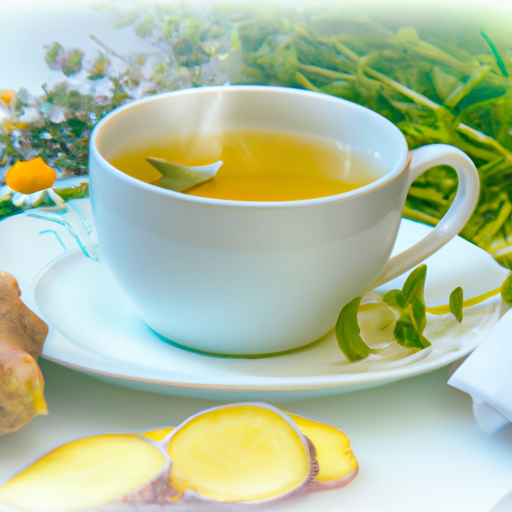Have you ever experienced the sensation of your digestive system functioning like a delicate orchestra, with each component working together seamlessly? Just as a conductor maintains harmony in a symphony, herbal tea can assist in keeping your digestion in optimal condition.
With its soothing properties and ability to promote digestive health, herbal tea is a natural and effective way to support your body’s digestive process.
Herbal tea, made from various plants and herbs, has been used for centuries as a remedy for various ailments. Its gentle nature and calming effects make it an ideal choice for those seeking relief from digestive issues.
From bloating and indigestion to constipation and stomach cramps, herbal tea can target specific digestive problems and provide much-needed relief.
But not all herbal teas are created equal. To reap the maximum benefits, it’s important to choose the right herbal tea for your specific digestive needs.
Whether it’s the soothing effects of chamomile, the digestive aid of peppermint, or the anti-inflammatory properties of ginger, there’s a herbal tea out there to suit your unique needs.
So, if you’re ready to harmonize your digestive system and enjoy the soothing benefits of herbal tea, join me as we explore the wonders of this natural remedy.
Get ready to sip your way to better digestion!
Key Takeaways
- Herbal tea can support digestive health and alleviate symptoms like bloating and stomach cramps.
- Chamomile tea has anti-inflammatory effects and can reduce stomach inflammation.
- Peppermint tea relaxes the muscles of the gastrointestinal tract, relieving bloating and indigestion.
- Ginger tea stimulates digestion by increasing the production of digestive enzymes.
Understanding Herbal Tea
If you’re looking to understand herbal tea, you’ll find that it’s a soothing and natural way to support your digestion.
Herbal teas are beverages made from the infusion of plants, herbs, or flowers, and they have been used for centuries to promote digestive health.
These teas are packed with compounds that have been shown to have soothing properties on the digestive system. For example, chamomile tea contains chamazulene, a compound that has anti-inflammatory effects and can help reduce stomach inflammation.
Peppermint tea has been found to relax the muscles of the gastrointestinal tract, relieving symptoms like bloating and indigestion.
Ginger tea can stimulate digestion by increasing the production of digestive enzymes.
Overall, herbal teas provide a gentle and effective way to support your digestion, making them a great addition to a healthy lifestyle.
Soothing Properties of Herbal Tea
With its soothing properties, can a warm cup of herbal tea provide relief for an unsettled stomach?
Herbal teas have been used for centuries to calm digestive discomfort and promote overall well-being. The soothing effects of herbal tea can help alleviate symptoms such as bloating, indigestion, and stomach cramps. It works by relaxing the muscles in the digestive tract, allowing for smoother digestion and reducing inflammation.
Additionally, certain herbs like peppermint and chamomile have been found to have specific digestive benefits. Peppermint can help relax the muscles of the gastrointestinal tract and reduce nausea, while chamomile has anti-inflammatory properties that can soothe an irritated stomach.
Incorporating herbal tea into your daily routine can be a natural and effective way to promote digestive health.
Transitioning into the subsequent section, let’s explore how herbal tea can further support our digestive system.
Promoting Digestive Health
When it comes to promoting digestive health, herbal tea can play a crucial role. It has the ability to stimulate digestion, helping to break down food more efficiently and prevent digestive issues.
Additionally, herbal tea can also alleviate constipation by promoting regular bowel movements and improving overall gut health.
Stimulating Digestion
Boost your digestion with herbal tea – it’s the perfect natural remedy to keep things running smoothly. Herbal teas have been used for centuries to stimulate digestion, promoting a healthy appetite and improving nutrient absorption. Various herbal teas are known for their digestive benefits, such as peppermint, ginger, and fennel. These teas contain compounds that help relax the muscles of the gastrointestinal tract, reducing bloating and discomfort. Additionally, they can increase the production of digestive enzymes, aiding in the breakdown and absorption of nutrients. The combination of these effects can optimize digestion and support overall digestive health. Now, let’s explore how herbal tea can also alleviate constipation and further enhance your digestive well-being.
Alleviating Constipation
Alleviating constipation is like finding the key to unlock a clogged drain, providing a smooth and effortless flow for your digestive system.
Herbal teas can be a wonderful natural remedy for this uncomfortable condition. Many herbal teas, such as peppermint and ginger, have been shown to alleviate bloating and improve gut health.
Peppermint tea contains menthol, which relaxes the muscles of the gastrointestinal tract, promoting easier bowel movements. Ginger tea, on the other hand, stimulates digestion and increases the production of digestive enzymes, aiding in the breakdown of food and relieving constipation.
These herbal teas also have anti-inflammatory properties, which can further support a healthy digestive system. So, if you’re looking to relieve constipation and promote better digestion, incorporating herbal teas into your routine may be a beneficial step towards targeting specific digestive issues.
Targeting Specific Digestive Issues
When it comes to targeting specific digestive issues, herbal teas can offer relief for common problems such as heartburn and acid reflux. These teas can help to soothe the digestive system and reduce the symptoms associated with these conditions.
Additionally, herbal teas can also be effective in easing nausea and calming an upset stomach, providing a natural and gentle remedy for these unpleasant symptoms.
Relieving Heartburn and Acid Reflux
Ease your discomfort and find relief from heartburn and acid reflux by incorporating herbal tea into your daily routine. Herbal teas have been used for centuries as heartburn remedies and natural remedies for acid reflux.
Certain herbal teas, such as chamomile, ginger, and peppermint, have properties that can help soothe the lining of the esophagus and reduce the production of stomach acid. Chamomile tea, for example, contains compounds that can relax the muscles in the digestive tract, preventing acid from flowing back up into the esophagus.
Ginger tea has anti-inflammatory properties that can help reduce inflammation in the stomach and esophagus, while peppermint tea can help relax the muscles and alleviate symptoms of heartburn. By incorporating these herbal teas into your daily routine, you can ease your discomfort and find relief from heartburn and acid reflux.
Moving on to the next section, let’s discuss how herbal tea can help in easing nausea and upset stomach.
Easing Nausea and Upset Stomach
Soothing an upset stomach and calming nausea can be achieved by incorporating a comforting cup of herbal tea into your daily routine. Herbal teas have long been used as alternative remedies for upset stomach and natural solutions for nausea relief.
When sipping on a warm cup of herbal tea, imagine the soothing sensation that washes over your stomach, providing relief from discomfort. Picture the gentle herbs working their magic, reducing inflammation and promoting healthy digestion. Additionally, envision the refreshing aroma of the tea as it wafts through the air, calming your senses and easing any feelings of queasiness.
By choosing the right herbal tea for digestion, you can optimize its benefits and promote a healthier gastrointestinal system.
Now, let’s explore how different herbal teas can aid in improving digestion.
Choosing the Right Herbal Tea for Digestion
When it comes to choosing the right herbal tea for digestion, two key options to consider are peppermint tea and ginger tea.
Peppermint tea is known for its ability to provide digestive comfort and alleviate symptoms such as bloating and gas.
On the other hand, ginger tea is highly effective in relieving nausea and indigestion.
Both teas have been used for centuries and have scientific evidence supporting their digestive benefits.
Peppermint Tea for Digestive Comfort
To enhance your digestive comfort, try incorporating peppermint tea into your daily routine. Peppermint tea is known for its numerous benefits when it comes to digestion. It’s been shown to relax the muscles of the gastrointestinal tract, which can help relieve symptoms of indigestion, bloating, and gas. Additionally, peppermint tea has anti-inflammatory properties that can soothe an irritated digestive system.
To make peppermint tea, simply steep a handful of fresh peppermint leaves in boiling water for 5-10 minutes. You can also add a touch of honey or lemon for extra flavor. Drinking a cup of peppermint tea after meals can promote healthy digestion and alleviate any discomfort you may be experiencing.
Moving on to the next topic, ginger tea is a fantastic option for relieving nausea and indigestion.
Ginger Tea for Nausea and Indigestion
If you’re feeling queasy or experiencing an upset stomach, ginger tea can be your soothing companion, like a gentle hand guiding you through choppy seas.
Ginger tea, derived from the root of the Zingiber officinale plant, has been used for centuries to alleviate nausea and indigestion. The active compounds in ginger, such as gingerol and shogaol, have anti-inflammatory and anti-spasmodic properties that can help relax the gastrointestinal muscles and relieve discomfort. Additionally, ginger tea stimulates the production of digestive enzymes, promoting better digestion and reducing bloating.
To make ginger tea, steep fresh ginger slices or ginger tea bags in hot water for about 10 minutes, then strain and enjoy. Incorporating ginger tea into your daily routine can provide numerous benefits for your digestive health.
Transitioning into the next section, let’s explore how you can easily incorporate other herbal teas into your daily routine.
Incorporating Herbal Tea into Your Daily Routine
When it comes to incorporating herbal tea into your daily routine for digestion, it’s important to consider when to drink it. I’ve found that drinking herbal tea before or after meals can help promote digestion and ease any discomfort.
Additionally, pairing herbal tea with a healthy diet can further enhance its benefits for digestion. By choosing the right herbal tea and incorporating it into your daily routine, you can support your digestive system and promote overall well-being.
When to Drink Herbal Tea for Digestion
Boost your digestion and soothe your stomach by sipping on a warm cup of herbal tea at the perfect time. Here are three key moments when drinking herbal tea can greatly benefit your gut health and alleviate bloating:
-
Before meals: Drinking herbal tea 15-30 minutes before a meal can stimulate digestive enzymes, helping your body break down food more efficiently and reducing the risk of bloating.
-
After meals: Enjoying a cup of herbal tea after a meal can promote digestion by relaxing the muscles in your gastrointestinal tract, preventing discomfort and aiding in nutrient absorption.
-
Before bedtime: Sipping on herbal tea before bed can calm your stomach and promote a restful night’s sleep, allowing your digestive system to work optimally overnight.
By incorporating these moments into your daily routine, you can enhance the benefits of herbal tea for gut health. Transitioning into the next section, let’s explore how pairing herbal tea with a healthy diet can further support your digestive system.
Pairing Herbal Tea with a Healthy Diet
To optimize your gut health, enhance the benefits of herbal tea by pairing it with a nutritious diet. Herbal tea can be a great addition to a weight loss plan as it aids in digestion and helps to control appetite. When combined with a healthy eating plan, herbal tea can support weight loss by boosting metabolism and promoting feelings of fullness.
To give you a better idea of how to pair herbal tea with a healthy diet, here is a table highlighting some popular herbal teas and their potential benefits for gut health:
| Herbal Tea | Benefits for Gut Health |
|---|---|
| Peppermint | Relieves indigestion and bloating |
| Ginger | Soothes nausea and improves digestion |
| Chamomile | Reduces inflammation and promotes relaxation |
| Dandelion root | Supports liver function and aids digestion |
| Fennel | Relieves gas and bloating |
By incorporating these herbal teas into your diet, you can improve your digestion and overall gut health. However, it’s important to note that herbal teas may not be suitable for everyone. Let’s now discuss some precautions and considerations to keep in mind when consuming herbal tea.
Precautions and Considerations
Before consuming herbal tea for digestion, it’s essential to be aware of any precautions and considerations.
While herbal teas can be beneficial for managing digestive disorders and preventing bloating, it’s important to consult with a healthcare professional before incorporating them into your diet.
Some herbal teas may interact with certain medications or have potential side effects. Additionally, not all herbal teas are suitable for everyone. For example, people with certain medical conditions like liver disease or kidney problems may need to avoid certain herbs.
It’s also important to remember that herbal teas shouldn’t be used as a substitute for medical treatment or a healthy diet. They should be used as a complementary therapy and part of an overall healthy lifestyle.
Frequently Asked Questions
What are the potential side effects of consuming herbal tea for digestion?
Potential side effects of consuming herbal tea for digestion may include stomach upset and diarrhea. However, when used in moderation, herbal tea can aid in weight loss by promoting digestion and reducing bloating.
Can herbal tea help with other digestive issues like bloating or constipation?
Herbal tea can be beneficial for other digestive issues like bloating and constipation. Certain herbal teas, such as peppermint or ginger tea, have been shown to relieve bloating, while chamomile tea may help with constipation. Additionally, herbal teas like green tea and oolong tea have been associated with weight loss, and ginger tea can provide heartburn relief.
Are there any specific herbal teas that should be avoided for individuals with certain medical conditions?
There are certain herbal teas that should be avoided by individuals with certain medical conditions due to potential interactions with medications. However, combining different types of herbal teas can provide additional benefits for digestion.
How long does it typically take for herbal tea to start aiding digestion?
Herbal tea typically takes around 30 minutes to start aiding digestion. While it may not have immediate effects, the compounds in herbal tea can stimulate digestive enzymes and promote a healthy gut environment.
Are there any age restrictions or limitations on consuming herbal tea for digestion?
There are no age restrictions for consuming herbal tea for digestion. It offers numerous health benefits, including aiding digestion. It can help relieve bloating, reduce inflammation, and promote a healthy gut.
Conclusion
In conclusion, incorporating herbal tea into your daily routine can be a soothing and effective way to promote digestive health. With its soothing properties and targeted benefits, herbal tea can help alleviate specific digestive issues and improve overall digestion.
By choosing the right herbal tea for your needs and considering any precautions, you can harness the power of nature to support your digestive system. So sit back, sip on a warm cup of herbal tea, and let its healing properties work their magic in your digestive tract.










